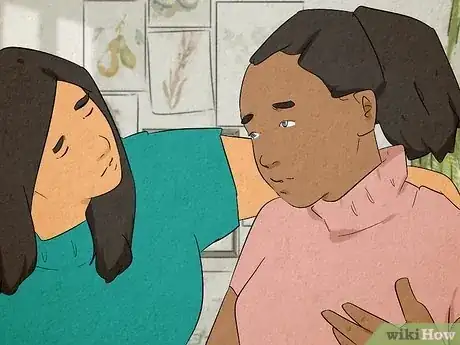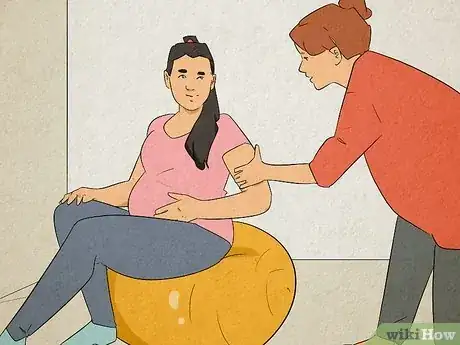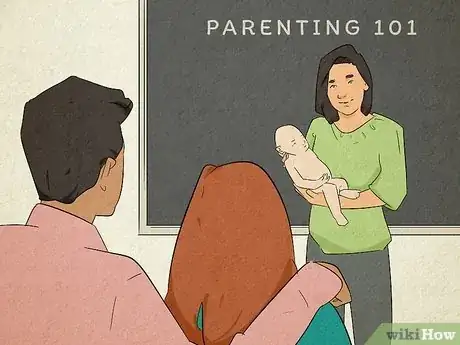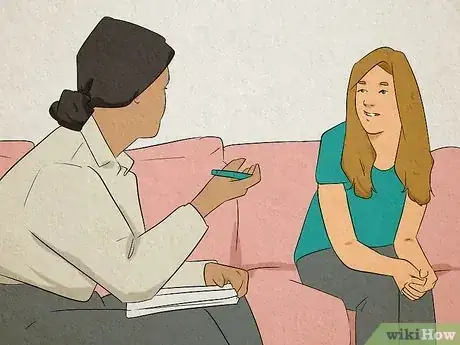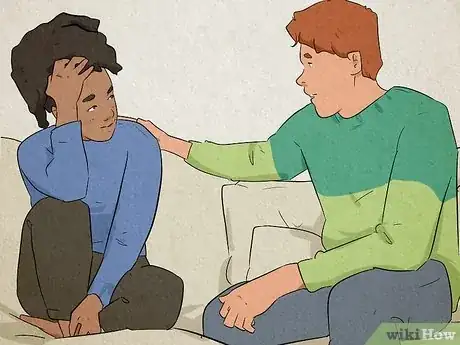This article was co-authored by Rebecca Tenzer, MAT, MA, LCSW, CCTP, CGCS, CCATP, CCFP. Rebecca Tenzer is the owner and head clinician at Astute Counseling Services, a private counseling practice in Chicago, Illinois. With over 18 years of clinical and educational experience in the field of mental health, Rebecca specializes in the treatment of depression, anxiety, panic, trauma, grief, interpersonal relationships using a combination of Cognitive Behavioral therapy, Psychodynamic therapy, and other evidence-based practices. Rebecca holds a Bachelor of Arts (BA) in Sociology and Anthropology from DePauw University, a Master in Teaching (MAT) from Dominican University, and a Master of Social Work (MSW) from the University of Chicago. Rebecca has served as a member of the AmeriCorps and is also a Professor of Psychology at the collegiate level. Rebecca is trained as a Cognitive Behavioral Therapist (CBT), a Certified Clinical Trauma Professional (CCTP), a Certified Grief Counseling Specialist (CGCS), a Clinical Anxiety Treatment Professional (CCATP), and a Certified Compassion Fatigue Professional (CCFP). Rebecca is also a member of the Cognitive Behavioral Therapy Society of America and The National Association of Social Workers.
There are 16 references cited in this article, which can be found at the bottom of the page.
This article has been viewed 78,099 times.
If your teenage friend is pregnant, it can be an overwhelming and frightening experience for her. There are many ways you can be supportive of her during this stressful and scary time. She may need help with day-to-day activities like managing in school or getting a ride to a doctor's appointment. She may feel depressed and need someone to talk to. And no matter what, she will need people to support her decision about what she decides to do about her pregnancy. Having good friends support her during this difficult time will help her physical, emotional, and social health.
Steps
Supporting Her Decision
-
1Explore her choices. Talk with her about the options she has and her feelings about each of them. Talk about each option without judgement or pressure as to what she should choose. This is her body, her pregnancy, and she is going to be the one who has to deal with the consequences, not you.
- She could decide to have an abortion. If this is what your friend wants to do, encourage her to get to a doctor or family planning clinic as soon as possible, because there are laws limiting abortions past a certain number of weeks of pregnancy (these vary by location). Also consider that there are parental notification requirements for minors to have an abortion in most states (if you are located in the United States). Find your state here: https://www.plannedparenthood.org/learn/abortion/parental-consent-notification-laws
- She could decide to give the baby up for adoption. Your friend may not be ready to be a parent but not comfortable with the idea of abortion. Her doctor or family planning clinic can help put her in touch with adoption agencies. An agency will assign her a counselor who will help her understand the legal and emotional ramifications of her choice.[1]
- She can choose to have the baby and raise it herself. Parenting can be both emotionally rewarding and exhausting. It is expensive to raise a child, and teen parents are more likely to be poor and have lower levels of education than their older counterparts. She also needs to factor in the involvement of the baby's father.[2]
-
2Listen to her as she decides what to do. Your friend will have an important decision to make regarding what she wants to do about her pregnancy. All three options have pros and cons and all three will likely impact her life in major ways. This is her decision to make alone.[3]
- Do not pressure her. Do not say things like, “I really want you to keep the baby because having a baby to play with is going to be so much fun!” or “I really hope you have an abortion, because having a baby is going to ruin your life.”
- Do not give her advice unless she asks for it. If she asks, you could say, “I think you will make the decision that's best for you. If I were in your shoes, I might decide to…” and explain your reasoning based on what you know about your friend's situation.
Advertisement -
3Support her as she tells her parents. More likely than not, she will need to tell her parents at some point, regardless of what option she chooses. Offer to be there with her when she tells them, and help her figure out what she wants to say.[4]
- Respect your friend's wishes about how she would like to tell them. Maybe she would like you there, or maybe not. Consider offering to be nearby in case she needs you. You could say, “While you tell your parents, I will wait outside of your house or in your bedroom.”
- Suggest that your friend practices telling her parents with you. You could pretend to be her parent, and she could rehearse what she is going to say with you.
- Expecting a child can be one of the most amazing and exciting times but can also produce quite a bit of anxiety.
- Depending on family dynamics, it may be difficult to communicate to family members about the pregnancy.[5]
- It is essential to have positive coping skills. If your friend is happy about the pregnancy, she can focus on that rather than how everyone else responds.[6]
-
4Withhold your judgment. Your friend may choose a different option than you would, or than you think she should. Accept her choice and support her. Even though you may be close and think you know what's best for her, understand that even close friends may not have the full picture.[7]
- Keep in mind that your friend is probably still questioning her decision, so do not nag her about her choice. Gentle questioning might be appropriate, like “If you're sure that's what you want to do, I'm behind you all the way,” but do not say something like, “I can't believe you're actually going to go through with this!”
Providing Day-to-Day Support
-
1Make sure she has taken a pregnancy test. Menstrual cycles can be irregular, particularly in teenagers. Your friend cannot assume she's pregnant from a late period alone, and needs to take a test to make sure. Keep in mind that other symptoms (like nausea, fatigue, or breast tenderness) are not necessarily indicative of pregnancy. Only a test can tell you for sure.[8]
- You can buy home pregnancy tests at any pharmacy. You can also have a pregnancy test done at a doctor's office or family planning clinic.
-
2Make sure her basic needs are being met. Sometimes upset parents will kick their pregnant daughter out of the house. If this happens to your friend, be sure to step in and offer shelter, food, and clothing.
- You could say to your friend, “I know things are hard right now. Please stay with me for a few days while we get things sorted out. I want you to be safe.”
- See if your parents are okay with her staying with you for a few days while things get sorted out, or see if another mutual friend's family will host her. You could say, “Mom, can Rebecca stay with us for a few days? She's having some problems. I promise we will talk about it, but right now I want to make sure she's got a place to stay.”
- Have your parents or another trusted adult get her connected to social services.[9]
-
3Encourage her to stay active and eat well. Help your friend make healthy food choices and learn about prenatal nutrition. Make sure she is taking a prenatal vitamin with folic acid, which is very important to help combat birth defects.[10]
- Ask her if she wants to walk or exercise with you. Exercise is safe and encouraged during pregnancy, unless she was told otherwise by her doctor. You could say, “Let's have a standing date once a week to walk for an hour. I need some exercise, too, and it will be more fun if I can do it with you!”[11]
-
4Get her to her doctor's appointments. Help her get to her doctor's appointments. Give her a ride if you can drive, or take a taxi or public transit together. Make sure she remembers to go to her appointments -- prenatal care is extremely important![12]
- Offer to come along to her appointments for moral support. You could say, “I'd be happy to come to the doctor with you next Thursday if you'd like. You can tell me if you'd rather have me wait in the waiting room or sit with you in the exam room.”
-
5Find her a birth class. Birth classes teach a woman and her birth support team what to expect in labor and delivery. They teach you ways to manage labor pain, as well as teach about prenatal care and discuss hospital procedures.[13]
- Find out which hospital your friend plans to deliver at. Most of the time, these classes are available at the hospital. Generally, these classes also will let you tour the maternity ward and see a delivery room where your friend can expect to give birth.
- Many hospitals also offer breastfeeding classes. If your friend is planning on breastfeeding, it is helpful to learn more about it and get professional guidance, to increase the likelihood of success.
-
6Locate a parenting class. Taking care of babies isn't easy! Your friend may have never changed a diaper or burped a baby. A parenting class can help teach your friend some basic skills to learn about infant care, as well as provide her with realistic expectations about what to expect with life with a baby.[14]
- Parenting classes can be found at hospitals, health departments, or community centers. You may also be able to find classes for taking care of older children at these places, when the baby is older.
- Parenting classes can also address the stress of having a child, and ways a parent can cope and get support.
-
7Help her get baby supplies. If she is planning on keeping the baby, help her get ready by researching and procuring necessary baby supplies, like clothes, a crib, and diapers.
- Baby supplies add up fast! Help your friend find gently-used bargains that will save some money. Babies grow so quickly that most things aren't used for very long and remain in good shape. Clip diaper and formula coupons for her.
- You could even throw a baby shower for her to help her get needed supplies. It will help her feel good to celebrate and know that people in her life support her.
-
8Keep her connected to school. As she progresses in her pregnancy and feels more uncomfortable and tired, she may not be as focused on her education. She may also be embarrassed to be at school with her growing belly and not want to be noticed. Help her find ways to continue her education in spite of her pregnancy.
- In the United States, Title IX makes it illegal for schools to exclude pregnant teens and teen parents from school. But many schools find ways around this law and find ways to “punish” the student, increasing the risk of dropping out.[15]
- Your friend has the right to stay at her current school and not be forced to transfer to an alternative school or into a GED program. Help her talk to her counselor or school administration to find out how they can accommodate her. Or, she may wish to find alternative schooling during her pregnancy. She also has the right to receive alternative services.
Offering Emotional Support
-
1Help her find adults she can talk to. Her parents may be supportive, though upset, but she still might want to find other adults with whom she can discuss her concerns and feelings. She may be more comfortable sharing difficult feelings with adults other than her parents.[16]
- Help her make a list of important adults in her life. These people might include extended family members, favorite teachers, coaches, or clergy. Help her come up with a plan to reach out to these people.
- For example, you could say, “Maybe we could go talk to Mrs. Miller after school. Do you want to meet me at my locker, and we could go over together?”
-
2Look for a counselor. In some cases, your friend might need more support than a trusted adult in her life can provide. She may be struggling with some difficult feelings around her pregnancy that need the support of a mental health care professional. Help her get in touch with these services.
- Connect with your local health department or youth and family service center to help find a counselor. Family planning clinics can also offer referral services.
- If your friend is very depressed and is talking about taking her life, call a suicide hotline immediately. The Suicide and Crisis Lifeline is 988. You can also text this number; other local hotline numbers outside of the US can also be recommended. Threats of suicide need to be taken extremely seriously.[17]
-
3Talk to your friend. Check in with her about how she's feeling, both physically and emotionally. See how you can help make things easier for her in any way.
- If she needs to vent, just listen. Don't offer advice or a platitude like, “Everything happens for a reason,” or “It's going to be okay.”[18]
- Help her deal with her emotions by acknowledging her pain. Be empathic and try to figure out what you would want to hear if you were in her shoes. It might be something like, “I am so sorry you are going through this right now. I know you are hurting and scared. But I will be with you every step of the way to help support you.”
- Understand she will probably be emotional. Pregnancy changes the hormones in her body, making her more susceptible to mood swings, crying, and anxiety. She is also dealing with a lot more stress because she is a pregnant teenager. Be patient with her as her emotions fluctuate.[19]
-
4Stand up for her. Don't gossip about your friend or spread stories about her pregnancy. If you hear someone talking about her when she's not there, speak up for her.
- You could say, “I don't think it's right to be talking about Monica when she's not here. Don't judge her choices. You're not the one going through this.”
- Find out from your friend what, if anything, is okay to share with others. Your friend might want to do her best to keep her pregnancy a secret, or she may want to only talk to certain people about it herself. Respect her wishes.
- If someone asks you about your friend, you could say, “I think it's probably best that you either talk to her yourself about it or don't bring it up at all. I think if one of us were in the same situation we would want to have some privacy and have our decisions be respected.”
-
5Stay close to her. Don't abandon her during this difficult time. She needs trustworthy, supportive friends and family more than ever.
- Check in with her repeatedly via text or phone to see how she's doing.
- Invite her to fun activities to help get her mind off her problems for a bit.
- Rally your friends around her and figure out some fun ways you can show your support for her right now. You could decide to slip encouraging notes into her locker, take turns bringing her her pregnancy cravings, or pool your money to help her out with the baby.
References
- ↑ https://www.childwelfare.gov/pubPDFs/f_pregna.pdf
- ↑ http://www.mayoclinic.org/healthy-lifestyle/tween-and-teen-health/in-depth/teen-pregnancy/art-20048124
- ↑ https://www.plannedparenthood.org/teens/going-to-the-doctor/im-pregnant-now-what
- ↑ https://www.plannedparenthood.org/teens/going-to-the-doctor/im-pregnant-now-what
- ↑ https://psychcentral.com/health/teenage-pregnancy-tips-for-telling-your-parents
- ↑ https://psychcentral.com/health/teenage-pregnancy-tips-for-telling-your-parents
- ↑ http://psychcentral.com/blog/archives/2013/06/24/discovering-your-teenage-daughter-is-pregnant-10-tips-for-parents/
- ↑ https://www.plannedparenthood.org/teens/going-to-the-doctor/pregnancy-testing
- ↑ https://www.cdph.ca.gov/HealthInfo/healthyliving/childfamily/Documents/MO-CPSP-STT-Psychosocial-TeenPregnancy.pdf
- ↑ http://www.mayoclinic.org/healthy-lifestyle/tween-and-teen-health/in-depth/teen-pregnancy/art-20048124?pg=2
- ↑ http://www.webmd.com/baby/guide/exercise-during-pregnancy#1
- ↑ https://www.nichd.nih.gov/health/topics/pregnancy/conditioninfo/Pages/prenatal-care.aspx
- ↑ https://www.womenshealth.gov/pregnancy/getting-ready/birthing-parenting-class.html
- ↑ https://www.womenshealth.gov/pregnancy/getting-ready/birthing-parenting-class.html
- ↑ https://www.aclu.org/pregnant-and-parenting-teens
- ↑ http://kidshealth.org/en/kids/talk-feelings.html
- ↑ http://988lifeline.org/#
- ↑ http://www.nsvrc.org/sites/default/files/file/just-rural-2013_active_listening.pdf
- ↑ http://www.webmd.com/baby/tc/emotional-changes-during-pregnancy-topic-overview

